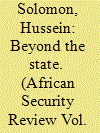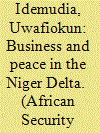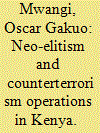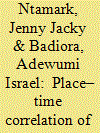|
|
|
Sort Order |
|
|
|
Items / Page
|
|
|
|
|
|
|
| Srl | Item |
| 1 |
ID:
151753


|
|
|
|
|
| Summary/Abstract |
Confronted with myriad security challenges, African states and the much-vaunted peace and security architecture of the African Union (AU) has proven not to be up to the challenge. Indeed, this is implicitly acknowledged by the AU itself if one considers the creation of such security structures as the African Mission in Somalia (AMISOM), which exists outside its peace and security architecture. This paper argues for a radical rethink of security structures on the African continent – one in which state structures of security coexist with newer forms of security actors, including private military companies (PMCs), community movements and the business sector. Whilst this shift in security actors is already happening on the ground, policymakers need to embrace this new reality.
|
|
|
|
|
|
|
|
|
|
|
|
|
|
|
|
| 2 |
ID:
151752


|
|
|
|
|
| Summary/Abstract |
The global restructuring of state–society relationships driven by neoliberal logic has not only allowed for the taming of the ‘state’, which has paradoxically accentuated its inadequacies, but has also facilitated, for better or for worse, the emergence of business – especially transnational corporations – as a major political force in global governance. Consequently, while the issues of peace and conflict have traditionally been the concern of governments, businesses are now increasingly being expected to make peace and conflict their concern. However, despite claims and counterclaims that businesses can be moneymakers and peacemakers, analyses of the relationship between business and peace remain largely embryonic. This paper seeks to contribute to this emerging business and peace debate by drawing on insights from the Niger Delta conflict to ascertain what we know and what we need to know if businesses are to become peacemakers in conflict zones in Africa.
|
|
|
|
|
|
|
|
|
|
|
|
|
|
|
|
| 3 |
ID:
151755


|
|
|
|
|
| Summary/Abstract |
This study contends that an analysis of the nexus between leadership and security offers useful insights into explaining conflict by stating that the conceptualisation of these argots, especially through the definition of leadership as a process, helps to explain and address Nigeria’s security challenges. By arguing that leaders’ ability to establish mutuality with their followers in any situation and set collectively-generated means for attaining these set goals for societal security, the study shows how such a relationship creates a secured state. This is not the case in Nigeria, where leaders’ security decisions are influenced by external actors rather than by their followers. By showing that the Nigerian ruling elite’s security agendas intersect with dominant global notions of security while neglecting genuine security interests of ordinary Nigerians, the study contextualises the complex global and local security interests in Nigeria. The lack of an intersection at home, however, has contributed to the emergence of extremists such as the Boko Haram sect, as well as the escalation of the acts of violence they perpetrate. As national insecurities become complex and intractable, ‘elegant’ or unilinear solutions – such as a military approach – lack the capacity to address these problems.
|
|
|
|
|
|
|
|
|
|
|
|
|
|
|
|
| 4 |
ID:
151750


|
|
|
|
|
| Summary/Abstract |
Counterterrorism operations in Kenya have often been hindered by a lack of collaboration, coordination and cooperation among the security agencies involved in such operations. This article examines the relationship between neo-elitism and counterterrorism security interagency activity in Kenya. Using neo-elitism as a framework for analysis, with specific reference to the September 2013 Westgate Mall attack counterterrorism operation, it is argued that the lack of collaboration, coordination and cooperation among Kenya’s counterterrorism security agencies often results in unintended adverse consequences. The interagency conflict over the Westgate operation was primarily about command and control, intelligence sharing and official information shared with the public pertaining to the stages of the siege and operation. These security agencies share similar responsibilities and jurisdictions in the rest of the country’s counterterrorism efforts. The interagency conflicts reveal that the country’s security elites pursue personal and agency-specific interests that are aimed at maintaining organisational supremacy over counterterrorism efforts. Recommendations are offered for how to tackle the problem of interagency conflict in order to enhance the effectiveness of counterterrorism operations in Kenya.
|
|
|
|
|
|
|
|
|
|
|
|
|
|
|
|
| 5 |
ID:
151749


|
|
|
|
|
| Summary/Abstract |
This article investigates the correlation of space and time in the clustering of robbery incidents in metropolitan Lagos. Analysis was carried out on 781 selected robbery incidents in 2013. Using the Mantel index to correlate place and time intervals for pairs of robbery incidents, the results show that robberies are respectively concentrated in residential areas, transport nodes and public places, peaking at midnight during weekdays. The results further show that this concentration is most likely greater than what would be expected on the basis of a chance distribution. The study concludes that various factors may exist which cause clusters of robberies to occur in these places at these times.
|
|
|
|
|
|
|
|
|
|
|
|
|
|
|
|
| 6 |
ID:
151754


|
|
|
|
|
| Summary/Abstract |
This paper examines the ways in which the military infringes on the social and political rights of soldiers who joined the Zimbabwe National Army in post-independence Zimbabwe. Contrary to the scholarly and policy debates that present Zimbabwean soldiers as the silent prop behind President Robert Mugabe and the perpetrators of political violence, this paper argues that these soldiers have also been victimised in army barracks. The victimhood of soldiers has been explicit in the ways in which they are forced to execute their duties beyond their professional expectations. In substantiating this argument, the paper explores the unethical military training and the ways in which soldiers are disciplined and punished through Chapter 11:02 of the draconian Defence Act. The paper’s contribution stems from a ‘rights’ perspective that emphasises the right to freedom, justice and protection, which is usually quite silent in the military. But the question is how can soldiers’ concerns be translated into new practices without compromising so-called ‘state security’?
|
|
|
|
|
|
|
|
|
|
|
|
|
|
|
|
| 7 |
ID:
151751


|
|
|
|
|
| Summary/Abstract |
Many African countries gained political independence in the 1960s. This era of independence came with promises and great expectations of economic, political and social development. Fifty years later, it is certain that the promises and expectations of independence have not been easily realised. Perennial violent conflicts have continued to ravage many countries in Africa, causing the catastrophic breakdown of law and order. Therefore, one of the major issues in conflict resolution discourse in Africa is how to develop functional mechanisms for the prevention of violent conflicts. This article examines the capacity of the International Criminal Court (ICC) to act as a mechanism for conflict prevention in Africa. Notwithstanding the doubts and uncertainties associated with the impact of law on conflict transformation, this article argues in the main that the ICC contributes to conflict prevention in Africa by expressing global norms of international law, challenging the culture of impunity in some countries, contributing to general deterrence, speedily intervening in some violent conflicts, and contributing to building some records of atrocities by identifying who did what.
|
|
|
|
|
|
|
|
|
|
|
|
|
|
|
|
|
|
|
|
|